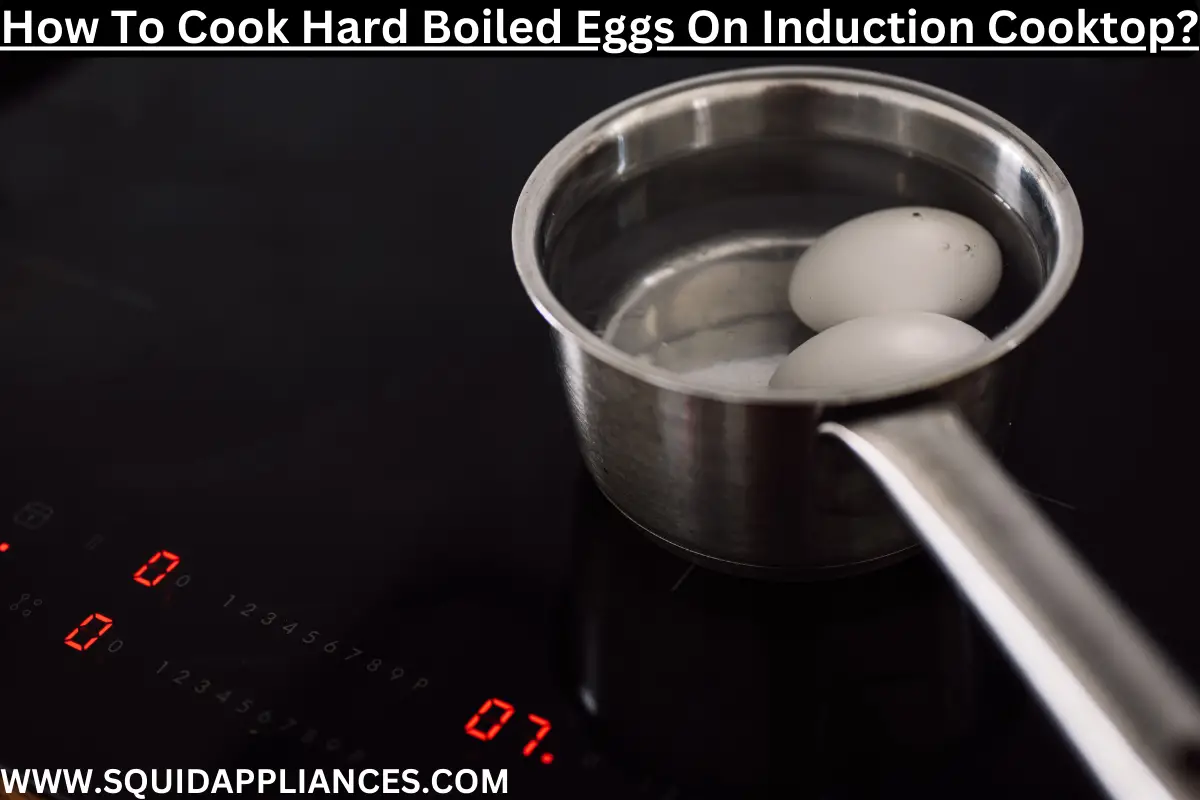‘Ever stood in front of your new, shiny induction cooktop, egg in hand, wondering how on earth to perfect a hard-boiled egg without the reassuring flame of a gas stove? You’re not alone.
Induction cooking can feel like you’ve stepped into a Sci-Fi movie with its high-tech features and sleek design. But fear not, dear reader! I’m here to demystify this alien technology for you.
With precise timing and some insider tips, we’ll transform those humble eggs into hard-boiled delights together. Using an induction cooktop can actually make the process quicker and more energy-efficient compared to traditional methods.
Ready to crack on? Let’s conquer this culinary challenge head-on!’
How to Cook Hard-Boiled Eggs on an Induction Cooktop?
Yes, you can cook hard-boiled eggs on an induction cooktop for a quick and energy-efficient result. According to a study by the U.S. Department of Energy, induction cooktops are about 84% energy efficient. Use compatible cookware, set to medium heat for 9–12 minutes, and cool in an ice bath for easy peeling. Enjoy your perfectly cooked eggs!
Key Takeaways
- Induction cooktops offer quick heat-up times and precise temperature control, making the process of boiling eggs quicker.
- It is important to use compatible cookware and keep the induction cooktop surface clean for safe cooking.
- Adjust the cooking time based on the size of the eggs and use the medium heat setting on the induction cooktop for 9–12 minutes.
- Cooling the eggs in an ice bath and gently cracking and rolling the shell make peeling easier, and peeling over a bowl or bin helps with easy shell disposal.
Understanding Induction Cooking
Imagine yourself standing in front of your sleek induction cooktop, the cool touch surface waiting for you to unlock the magic of electromagnetic energy that’ll transform a simple egg into a perfectly hard-boiled delight.
Induction benefits from quick heat-up times and precise temperature control, making it ideal for this task.
Remember safety measures: always use compatible cookware and keep the surface clean.
Let’s dive into mastering induction cooking!
Preparing for Cooking
While you might think preparing for this task is as simple as tossing a dozen orbs of potential into a pot, there’s an art to it that involves selecting fresh produce, ensuring your water level is just right, and setting the perfect temperature.
Egg selection is crucial; fresher eggs make better hard-boiled ones.
For ingredient preparation, fill the pot with enough water to cover the eggs by about 1 inch.
Cooking the Eggs
Once you’ve prepped, it’s time to delicately place your chosen eggs into the pot, a moment where precision and gentleness can make all the difference in achieving that perfect texture.
| Step | Instructions | Expert Tips |
|---|---|---|
| 1 | Set induction cooktop to medium heat. | Use fresh eggs for best results. |
| 2 | Cook for 9-12 minutes. | Adjust time based on egg size. |
| 3 | Cool and peel carefully. | Try cracking techniques for easy peeling. |
Remember, egg freshness and proper peeling are key to excellent hard boiled eggs.
Cooling and Peeling the Eggs
Now that we’ve successfully cooked our eggs, it’s time to cool and peel them. We’ll be using the ice bath method for cooling, which not only halts the cooking process but also makes peeling a breeze.
I’ll then share some indispensable tips to make the peeling process even easier, ensuring you get perfectly smooth hard-boiled eggs every time.
Using the Ice Bath Method
After your eggs have finished cooking on the induction cooktop, you’ll want to plunge them straight into an ice bath. Here’s how:
- Prepare a bowl filled with ice and water.
- Using tongs, carefully transfer each egg into the bowl.
- Let them sit for at least 15 minutes for optimal temperature control.
- Peel and enjoy!
The ice bath benefits include halting the cooking process instantly and making peeling incredibly easy.
Tips for Easy Peeling
Believe it or not, about 40% of people find peeling eggs frustrating, but there are some tricks to make it a breeze.
Firstly, tap the egg gently on a hard surface to crack the shell. Roll it softly under your hand for even cracking. The shell should peel off easily!
For hassle-free shell disposal, peel over a bowl or bin.
Trust me, these peeling techniques will simplify your cooking process!
Storing and Using Hard Boiled Eggs
Once you’ve mastered the art of cooking hard-boiled eggs on your induction cooktop, you’ll find a myriad of ways to store and use them.
Store these protein-rich snacks in the fridge for up to one week. They make a great addition to salads or can be used in egg salad recipes. Remember, older eggs peel easier than fresh ones!
Enjoy their versatility and health benefits anytime.
Frequently Asked Questions
Can I use any type of saucepan to cook hard boiled eggs on an induction cooktop?
No, you can’t use just any old pan for your egg nutrition quest. You need induction cookware, my friend! It’s a must when cooking hard boiled eggs on an induction cooktop – it optimizes heating and timing.
How can I prevent the egg shells from cracking during cooking?
To prevent eggs from cracking, ensure they’re fresh as egg freshness impacts the shell strength. Adding a tablespoon of vinegar to the boiling water also benefits by strengthening the shells and minimizing cracking.
Can I cook multiple eggs at the same time on an induction cooktop?
Dancing to the tune of efficiency, I often cook multiple eggs on my induction cooktop. Egg quantity doesn’t affect the result if your cooktop has the capacity. Just ensure even heat distribution for perfect hard-boiled eggs.
How long can I keep hard boiled eggs in the fridge before they go bad?
Incorporating my egg storage tips, hard boiled eggs can stay fresh in the fridge for up to one week. Be aware of fridge temperature effects – it should be at or below 40°F for optimal freshness.
What are some recipes that I can use hard boiled eggs in?
Surely, salads and spreads sing with Egg Salad Variations. Deviled Eggs Twists totally transform traditional tastes. Expert tip: keep those cooking times tight for tender textures. Delight in detailed instructions for delectable dishes using hard boiled eggs.
Conclusion
So, there you have it! I’ve successfully boiled eggs using an induction cooktop. It’s astounding that, according to a study by the U.S. Department of Energy, induction cooktops are about 84% energy efficient! Therefore, not only did this method provide perfectly cooked eggs, but it also conserved energy.
Remember to carefully follow these detailed instructions for precise cooking times and expert tips.
Happy cooking with your induction cooktop!






